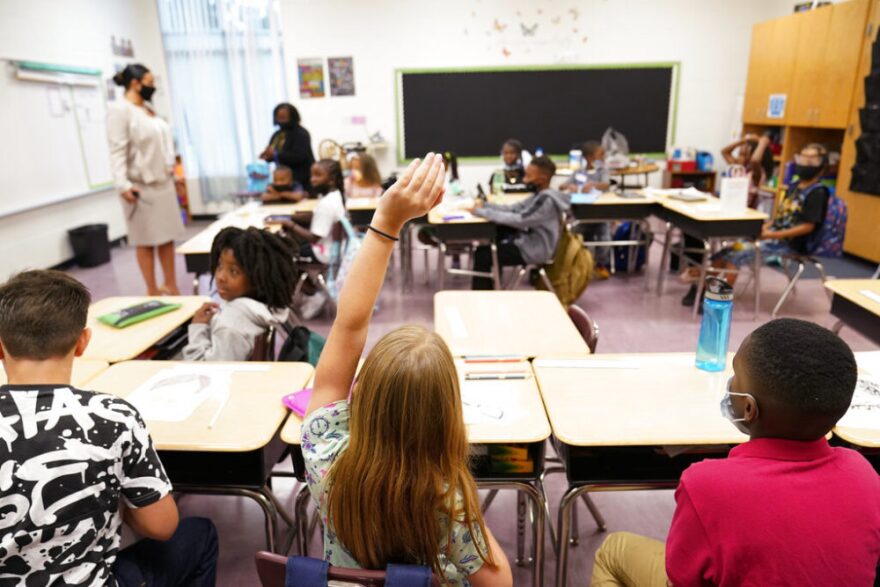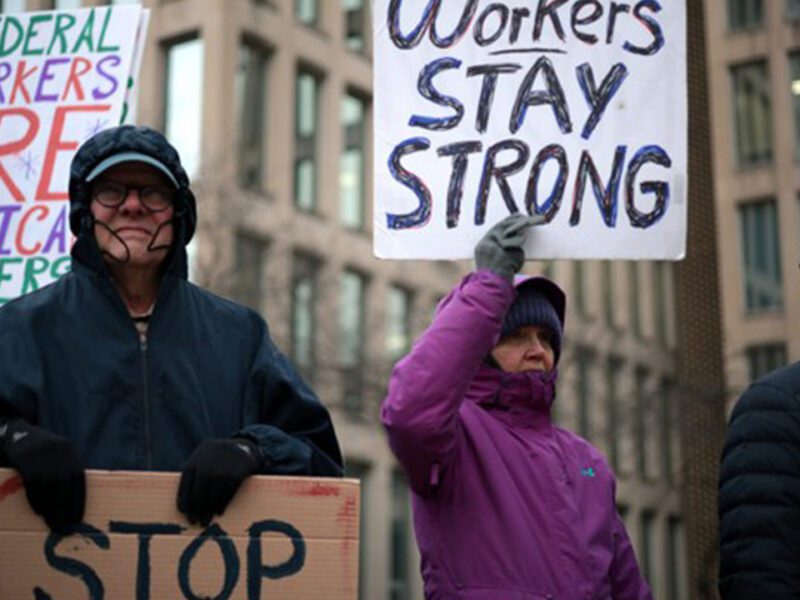
Some South Florida teachers say ‘Don’t Say Gay’ law is making them consider leaving the classroom
WLRN | By Kate Payne | April 12, 2022
It’s an educator’s responsibility to make kids feel safe in their schools. Florida teachers who are gay or trans are especially worried they won’t be able to do that anymore, because of the new Parental Rights in Education law, which opponents refer to as “Don’t Say Gay.” The controversial measure, which goes into effect in July, is making some teachers question whether to stay in the classroom.
It’s an incredibly difficult decision to make, especially for LGBTQ educators: Work under conditions they feel are wrong or leave their students behind?
Nikki Solomon used to teach fourth grade at Key Biscayne K-8 Center. She’s gay and she resigned earlier this year while House Bill 1557 was still being debated.
“I hope they keep my stickers on the wall that say this is a safe place because I hope it still is a safe place,” Solomon said.
A lot of things factored into Solomon’s decision, but she said this policy was the tipping point.
“I never, ever, ever thought that I would leave the school or the profession,” she said.
The legislation bans classroom instruction on gender identity and sexual orientation in kindergarten through third grade — and in any grade if it’s not considered “age” or “developmentally appropriate.”
But what that means isn’t defined. And parents can sue the district if they suspect schools aren’t complying.
“Who’s to say something’s age appropriate? The angry parent, right?” Solomon said.
The law will also require districts to tell parents about changes in their kids’ health and wellbeing.
According to the Tampa Bay Times, that aspect of the law was written specifically in response to policies in Broward and Palm Beach schools. The sponsors of the law want to overturn local rules that aim to stop school employees from outing queer kids to their families.
That makes students like E wonder who they can trust. He’s a senior at a Palm Beach County high school and he’s trans. WLRN is using just his first initial because he’s not out to his parents.
“You have to find a way to stay safe and stay hidden … and that’s horrible because nobody should have a reason to hide,” E said.
According to Politico, the push for the bill began as state lawmakers learned about LGBTQ support guides used by some local districts, which strongly discourage staff from disclosing a student’s sexual orientation or gender identity without their permission, even to a child’s parents.
“With the very limited exception involving the imminent fear of physical harm, it is never appropriate to divulge the sexual orientation of a student to a parent without the student’s consent,” reads a section from the support guide developed by Broward County Public Schools.
E says outing students, especially those who don’t have supportive families, can put them in danger.
“Children can and will probably end up without homes or further abused,” he said. “It just opens up a huge amount of possibilities that could end very badly.”
The Florida Chapter of the American Academy of Pediatrics has condemned the legislation. The group pointed out that LGBTQ children are far more likely than their peers to attempt suicide.
According to the advocacy group The Trevor Project, in 2021, 42% of LGBTQ young people seriously considered killing themselves, including more than half of those who are trans and nonbinary.
If you or someone you know may be considering suicide, contact the National Suicide Prevention Lifeline at 1-800-273-8255 (en español: 1-888-628-9454; deaf and hard of hearing: dial 711, then 1-800-273-8255) or the Crisis Text Line by texting HOME to 741741.
“I’m not going to out anybody to anybody’s parents. To anybody, ever,” saidRobin Medvetz, a history teacher at Seminole Ridge Community High School in Loxahatchee. Medvetz is gay.
“So that’s the situation. I will be forced to break the law,” said Medvetz, referring to the portion of the legislation aimed at forcing districts to disclose information to students’ parents.
Advocates say the law is already having a chilling effect — even though it doesn’t go into effect until July.
Citing House Bill 1557, the Palm Beach County school district is removing two books from classrooms for further review: “Call Me Max”and “I Am Jazz.” The stories are about transgender kids discovering who they are, navigating name changes and making friends. In a note to principals, Deputy Superintendent Ed Tierney said the books should be kept out of students’ reach until the review is complete.
Aurora Dominguez prides herself on creating a supportive environment for her students. She teaches journalism at Boca Raton Community High School and has curated her own classroom library, with a focus on titles that feature people of color and LGBTQ characters.
“Students should be able to relate to the characters,” she said. “We should have Hispanic characters. We should have characters from different backgrounds. We should have LGBTQ characters. Because our world is not one thing.”
Dominguez added there’s power in students seeing themselves represented on the page and out in the world.
“Maybe I want to teach a book that’s diverse. What worries me the most is I won’t be able to do that, if it becomes an issue,” Dominguez said. “That scares me.”
Melissa knows what it’s like to have to hide who you are. She works for Broward County Public Schools. WLRN isn’t using her last name because she’s planning on leaving her job and hasn’t notified her employer.
“The first three years of my teaching experience, I lived in fear of being myself. Of even mentioning my wife or anything like that, because … Florida,” she said.
Now Melissa is worried about her son.
If another student bullies him for having two moms, will a teacher be able to intervene? Would that be considered illicit classroom instruction on sexual orientation?
“Because if he’s no longer welcome to bring in his family picture or share his family tree, or talk about his two moms,” she said, “it’s gonna be heartbreaking to me as a parent, as an educator, as a person, as a mom.”
Melissa says she and her wife aren’t waiting to see what the full effects of the policy could be — they’re planning on leaving the state.
Medvetz, the Palm Beach County history teacher, says she’s worried about her young son, too — that this law will make him feel ashamed of his family. But she says she’s staying put.
“I made sure I’m up to date with all my union dues and whatnot in case something does come towards me,” Medvetz said. “Because, again, in the end, I’m there to protect my students.”
Medvetz wants her students to know she’s not going anywhere.





